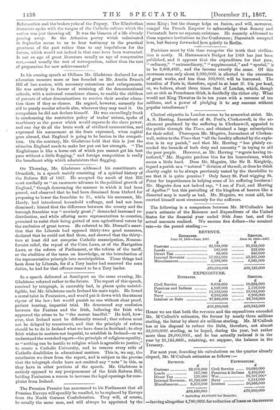On Thursday, Mr. Gladstone addressed his constituents at Ortnskirk, in
a speech mainly consisting of a spirited history of the Reform Bill of 1867. He accepted the result of that Bill most cordially as "an enormous advance in the political growth of England," though denouncing the manner in which it had been passed, and observed that he had been dismissed from Oxford for proposing to lower the franchise to 71., while his successor, Mr. Hardy, had introduced household suffrage, and had not been dismissed; hinted that the difference between the county and the borough franchise was " unwisely great ;" demanded increased re- distribution, and while offering more representatives to counties, promised to resist their being gutted of non-agricultural voters by the exclusion of great towns. He referred to Mr. Disraeli's asser- tion that the Liberals had opposed thirty-two good measures, declared that he could not find them, and showed that the thirty- two at least did not comprise Catholic emancipation, Noncon- formist relief, the repeal of the Corn Laws, or of the Navigation Laws, or the reform of Parliament, or the reform of the tariff, or the abolition of the taxes on knowledge, or the introduction of the representative principle into municipalities. These things had been done by Liberals, for if a Tory leader had removed the corn duties, he had for that offence ceased to be a Tory leader.






































 Previous page
Previous page